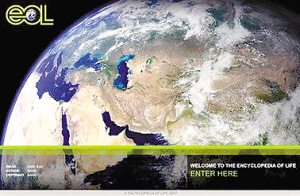The first pages of a website containing all known information about all the species on Earth have been completed
Scientists around the world are set to embark on a grand project to compile knowledge of all 1.8 million known species on Earth into an encyclopedia and upload it to the Internet, making it freely available to the world. The entire project will cost more than $100 million. On the 9th, several top scientific research institutions and universities in the world released the plan in Washington, the United States, at the same time, the first information of the large-scale "encyclopedia" was also published.
It took 10 years and 300 million pages
Dubbed the "Encyclopedia of Life," the project will include descriptions, photos, maps, video, audio and amateur observations of each species, as well as complete genomes and web links to scientific research papers. It is reported that it will take 10 years to compile the entire "encyclopedia".
If the "Encyclopedia of Life" project is completed as scheduled, the encyclopedia will have 300 million pages. If these pages were connected one after the other, they would be 83,720 kilometers long, enough to circle the Earth twice along the equator.
Will be open to the public free of charge
So far, two scientific foundations (the MacArthur Foundation and the Sloan Foundation) have provided $12.5 million to support the first two and a half years of work, but the work will be free to everyone. The director of the program, James. "It's an interactive zoo," says Mr Edwards. Edwards is currently working on a global Biodiversity Information System.
The depth and difficulty of the content in an encyclopedia can be adjusted, so that it can provide useful and understandable material for ordinary schoolchildren or specialized researchers. In addition, the plan emphasizes the concept of "citizen scientists," where everyone can add their observations and opinions to the side pages of the encyclopedia. The key details of the species and the scientific section will be reviewed by experts and compiled.
"Encyclopedia of Life" project chair and professor Jesse Rockefeller University in New York. Asubel says the goal of the encyclopedia is to make species knowledge accessible to all. Once written, the Encyclopedia of Life will be maintained by a team of 25 to 35 people.
The free encyclopedia will focus on animals, plants, fungi, and microbes in the future. Scientists also said that as soon as a new species is discovered, relevant information can be added to the "encyclopedia" on the same day. Experts estimate that there are about 8 million species on Earth, but less than a quarter of them have been identified and named. In addition, fossils of extinct species, including dinosaurs, can be found in the book.
On the project's demo Web page (www.eol.org), you can already see entries about polar bears, rice and other species.
9, the Smithsonian Institution acting secretary General Christian · Sampa showed samples of polar bear pages, including photos of the bears, maps of their distribution, research results, and data on molecular biology, genetics, and what they eat during reproduction. Data for other species will be compiled according to a similar structure. (Our comprehensive report)
